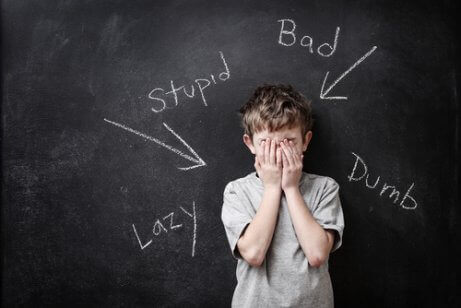The Pygmalion Effect in Children: What You Should Know

How influential do you think the expectations and attitudes of adults are with respect to their children? We’ll analyze the Pygmalion effect and how it affects children, which is precisely linked to the influence of parents on their children’s performance.
The Pygmalion effect in children was discovered at the end of the 1960s. It showed how teachers’ expectations influenced student performance. The success of their methods in each case was also examined.
This phenomenon receives its name in honor of an old sculptor of Cyprus. The myth states that Pygmalion had a statue called Galatea, whom he treated like a real woman.
One night, by the grace of the goddess Aphrodite, the work of the sculptor came to life. Pygmalion believed that this would happen, and his hopes were fulfilled.
The Pygmalion effect was created to refer to the transcendence that people can exercise in others according to the trust and expectations they place on them.
How does the Pygmalion effect influence children?
It’s nothing new that children see role models in their parents and teachers. Therefore, words, gestures, and demonstrations of security and confidence from them can have a huge influence on their results.
In fact, the underlying explanation is much simpler than you’re able to believe: children learn to see themselves according to how you teach them. If you distrust their abilities, their chances of achieving success in different areas will decrease significantly.
The Pygmalion effect in children transversely affects the activities in which the children’s self-esteem is evident. Therefore, it can manifest itself in different areas of their life:
- During their educational journey.
- In sports, art, or any other kind of activities.
- In their relationship with their environment: parents, siblings, friends, teachers, etc.

What actions from adults influence children?
Here are some daily actions from adults that encourage their children’s confidence:
- Language: Both the tone and the words themselves are decisive for expressing feelings towards others. Children are very persuasive and recognize the distrust or doubts you convey.
- Gestures: Nonverbal language is as important, if not more important than the words you speak.
- Attention: Children notice that you try harder to help or advise them with activities that you consider good. On the contrary, when your expectations are low, they tend to pay less attention to that activity.
- Participation: If you attend games that you think they’ll win versus those you don’t attend because you think they’ll lose, their participation in the winning games will increase. This is similar to the point made above.
- Demand: If your expectations are lower, you’ll settle for less effort on your part. And this shows.
“The Pygmalion effect in children transversely affects the activities in which the children’s self-esteem is evident.”
Negative consequences of the Pygmalion effect
As much as you tell them again and again that you trust them and believe that they’re capable of doing something, your children can tell if you’re sincere via your gestures or actions.
Also, if you try to solve their problems for them without giving them any responsibility, they’ll assume that they aren’t competent enough to complete those tasks on their own.
This could go further: if you make decisions about their present or future without even discussing it with them, you could seriously hinder their ability to make decisions for themselves.
This includes everything from everyday issues, such as which outfit to wear, to more important things, such as attending a particular school or participating in a certain sport.
How will their relationship with others be if their own parents don’t value their opinion or allow them to take responsibility for their own lives?

The good side of the Pygmalion effect
A key aspect to take advantage of the Pygmalion effect in children is for you to help your children find their potential. You should also encourage them to make the most of it.
Undoubtedly, this will be much more productive than criticizing them for the things they don’t know how to do well. However, you should allow them to discover their likes and talents on their own in order to make the process more beneficial.
Having confidence and appreciation of their progress is also very important. This will give children the motivation to continue with their efforts. In addition, it will reinforce the belief that they’re indeed capable of fulfilling their goals.
Be careful. All of this doesn’t mean that you should deceive them and make them believe they’re capable of everything. Limitations and failures exist and we all encounter them. The secret lies in helping your children understand that they must strive to overcome those obstacles.
In conclusion, the Pygmalion effect in children is a double-edged sword. It can be a very important tool for their growth, but it can also create a ceiling that’s very difficult for them to reach. The outcome will depend on your attitude towards your children.
How influential do you think the expectations and attitudes of adults are with respect to their children? We’ll analyze the Pygmalion effect and how it affects children, which is precisely linked to the influence of parents on their children’s performance.
The Pygmalion effect in children was discovered at the end of the 1960s. It showed how teachers’ expectations influenced student performance. The success of their methods in each case was also examined.
This phenomenon receives its name in honor of an old sculptor of Cyprus. The myth states that Pygmalion had a statue called Galatea, whom he treated like a real woman.
One night, by the grace of the goddess Aphrodite, the work of the sculptor came to life. Pygmalion believed that this would happen, and his hopes were fulfilled.
The Pygmalion effect was created to refer to the transcendence that people can exercise in others according to the trust and expectations they place on them.
How does the Pygmalion effect influence children?
It’s nothing new that children see role models in their parents and teachers. Therefore, words, gestures, and demonstrations of security and confidence from them can have a huge influence on their results.
In fact, the underlying explanation is much simpler than you’re able to believe: children learn to see themselves according to how you teach them. If you distrust their abilities, their chances of achieving success in different areas will decrease significantly.
The Pygmalion effect in children transversely affects the activities in which the children’s self-esteem is evident. Therefore, it can manifest itself in different areas of their life:
- During their educational journey.
- In sports, art, or any other kind of activities.
- In their relationship with their environment: parents, siblings, friends, teachers, etc.

What actions from adults influence children?
Here are some daily actions from adults that encourage their children’s confidence:
- Language: Both the tone and the words themselves are decisive for expressing feelings towards others. Children are very persuasive and recognize the distrust or doubts you convey.
- Gestures: Nonverbal language is as important, if not more important than the words you speak.
- Attention: Children notice that you try harder to help or advise them with activities that you consider good. On the contrary, when your expectations are low, they tend to pay less attention to that activity.
- Participation: If you attend games that you think they’ll win versus those you don’t attend because you think they’ll lose, their participation in the winning games will increase. This is similar to the point made above.
- Demand: If your expectations are lower, you’ll settle for less effort on your part. And this shows.
“The Pygmalion effect in children transversely affects the activities in which the children’s self-esteem is evident.”
Negative consequences of the Pygmalion effect
As much as you tell them again and again that you trust them and believe that they’re capable of doing something, your children can tell if you’re sincere via your gestures or actions.
Also, if you try to solve their problems for them without giving them any responsibility, they’ll assume that they aren’t competent enough to complete those tasks on their own.
This could go further: if you make decisions about their present or future without even discussing it with them, you could seriously hinder their ability to make decisions for themselves.
This includes everything from everyday issues, such as which outfit to wear, to more important things, such as attending a particular school or participating in a certain sport.
How will their relationship with others be if their own parents don’t value their opinion or allow them to take responsibility for their own lives?

The good side of the Pygmalion effect
A key aspect to take advantage of the Pygmalion effect in children is for you to help your children find their potential. You should also encourage them to make the most of it.
Undoubtedly, this will be much more productive than criticizing them for the things they don’t know how to do well. However, you should allow them to discover their likes and talents on their own in order to make the process more beneficial.
Having confidence and appreciation of their progress is also very important. This will give children the motivation to continue with their efforts. In addition, it will reinforce the belief that they’re indeed capable of fulfilling their goals.
Be careful. All of this doesn’t mean that you should deceive them and make them believe they’re capable of everything. Limitations and failures exist and we all encounter them. The secret lies in helping your children understand that they must strive to overcome those obstacles.
In conclusion, the Pygmalion effect in children is a double-edged sword. It can be a very important tool for their growth, but it can also create a ceiling that’s very difficult for them to reach. The outcome will depend on your attitude towards your children.
All cited sources were thoroughly reviewed by our team to ensure their quality, reliability, currency, and validity. The bibliography of this article was considered reliable and of academic or scientific accuracy.
- Castillo Echevarría, R. (2014). El efecto Pigmalión.¿ Hasta qué punto determina nuestro futuro la visión que los demás tienen de nosotros?. https://repositorio.comillas.edu/xmlui/handle/11531/272
- Vargas, J. G. (2015). El efecto Pigmalión y su efecto transformador a través de las expectativas. Perspectivas docentes, (57). http://revistas.ujat.mx/index.php/perspectivas/article/view/1028
This text is provided for informational purposes only and does not replace consultation with a professional. If in doubt, consult your specialist.








